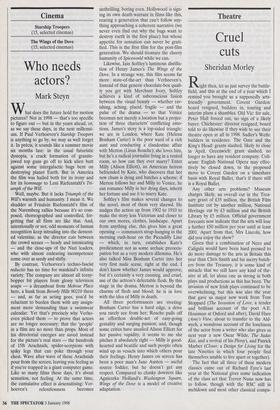Cinema
Starship Troopers (15, selected cinemas) The Wings of the Dove (15, selected cinemas)
Who needs actors?
Mark Steyn
What does the future hold for motion pictures? Not in 1998 — that's too specific to figure out — but in the years ahead, or, as we say these days, in the next millenni- um. If Paul Verhoeven's Starship Troopers is anything to go by, we may as well forget it. In précis, it sounds like a summer movie six months late: in the usual futuristic dystopia, a crack formation of granite- jawed top guns go off to kick alien butt against some intergalactic bugs bent on destroying planet Earth. But in America the film was hailed both for its irony and for its hommage to Leni Riefenstahl's Tri- umph of the Will.
Well, maybe. But it lacks Triumph of the Will's warmth and humanity. I mean it. We shudder at Fraulein Riefenstahl's film of the Nuremberg rallies because it's so com- posed, choreographed and controlled, for- getting that all films are like that. And, intentionally or not, odd moments of human recognition keep intruding into the dement- ed valentine, as the director cuts between the crowd scenes — heady and intoxicating — and the close-ups of the Nazi leaders, who with almost endearing incompetence come over as seedy and shifty.
By contrast, Verhoeven's techno-fascist reductio has no time for mankind's infinite variety. The company are almost all teeny- bopper bit players from glossy television soaps — a dreamboat from Melrose Place here, a hunk from Beverly Hills 90210 there — and, as far as acting goes, you'd be reluctant to burden them with any assign- ment more demanding than a swimwear calendar. Yet that's precisely why Verho- even picked them — to prove that actors are no longer necessary; that the 'people' in a film are no more than props. Most of his directorial energies are saved instead for the picture's real stars — the hundreds of 15ft Arachnids, spider-scorpions with spiky legs that can poke through your chest. Wave after wave of these Arachnids pour from the screen, leaving you feeling as if you're trapped in a giant computer game. Like so many films these days, it's about sensation, not feeling. At the same time, the cumulative effect is desensitising: Ver- hoeven's relentlessness becomes unthrilling, boring even. Hollywood is sign- ing its own death warrant in films like this, rearing a generation that can't follow any- thing approaching a coherent narrative (we never even find out why the bugs want to destroy earth in the first place) but whose appetite for sensation can never be grati- fied. This is the first film for the post-film generation. We should treasure the cheery humanity of Spiceworld while we can.
Likewise, Iain Softley's luminous distilla- tion of Henry James's The Wings of the Dove. In a strange way, this film seems far more state-of-the-art than Verhoeven's. Instead of that generic chocolate-box quali- ty you get with Merchant Ivory, Softley achieves a kind of subconscious fusion between the visual beauty — whether rav- ishing, aching, placid, fragile — and the pulse of the drama — so that Venice becomes not merely a location but a projec- tion of three characters' conflicting emo- tions. James's story is a lop-sided triangle: we are in London, where Kate (Helena Bonham Carter) is the poor ward of a rich aunt and conducting a clandestine affair with Merton (Linus Roache); she loves him, but he's a radical journalist living in a rented room, so how can they ever marry? Enter Milly (Alison Elliott), an American heiress befriended by Kate, who discovers that her new chum is dying and hatches a scheme: if Merton follows her and Milly to Venice, he can romance Milly in her dying days, inherit her fortune and use it to marry Kate.
Softley's film makes several changes to the novel, most of them very shrewd. He nudges the action up from 1902 to 1910 to make the story less Victorian and closer to our own mores, clothes, landscape. Apart from anything else, this gives him a great opening — commuters strap-hanging in the morning rush-hour on the Piccadilly Line — which, in turn, establishes Kate's predicament not as some archaic preoccu- pation but as a very modern dilemma. He's also talked Miss Bonham Carter into her very first nude scene, right at the end. I don't know whether James would approve, but it's certainly a very cunning, and cruel, use of the actress's delectable flesh. By this stage in the drama, Merton is beyond the charms of flesh and blood; he is in love with the idea of Milly in death.
All three performances are riveting: Bonham Carter has a hard edge, a drive you rarely see from her; Roache pulls off an effortless double-act of easy-going geniality and surging passion; and, though some critics have assailed Alison Elliott for her passive vapidity, it seems to me she pitches it absolutely right — Milly is good- hearted and beatific and such people often wind up as vessels into which others pour their feelings. Henry James on screen has been a poor man's Jane Austen — useful source fodder, but he doesn't get any respect. Compared to clunky downers like Agnieszka Holland's Washington Square, Wings of the Dove is a model of creative adaptation.


















































 Previous page
Previous page